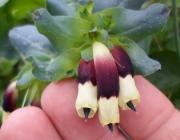Abstract:
The ability to reuse treated wastewater (TWW) would be of significant benefit to agriculture whilst at the same time providing a valuable water resource. This study concerned the effects of three various levels of treated wastewater (0%, 50% and 100% TWW) on seed germination and plant development of three different varieties of tomato (Lycopersicon esculentum) (viz. Toufan, Heinz and Bouzina). Irrigation with TWW persisted 15 days for the germination stage and 120 days for the growth and development stage. A control plot irrigated with a pure water (groundwater) was also set up in order to compare the seeds and the plants response to different concentrations of irrigation water. The final germination was expressed as a percentage of the total number of seeds in each treatment. This study has demonstrated that treated wastewater improves the germination in Heinz variety and had no effect on both Toufan and Bouzina varieties whether it is pure or diluted by half. For the growth stage, the statistical analysis showed that the Toufan variety has tolerated successfully the TWW irrigation with its high and moderate concentrations, and this by analysing all the morphophysiological parameters studied in this work (leaves numbers, stem and root length and dry biomass, relative water content and rate water loss).
Publisher's Version
